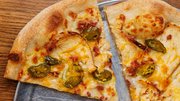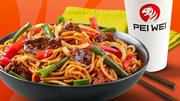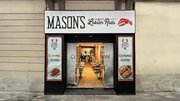Article
Asian Box CEO: Gluten-free zone leading to brand's growth
The 1-year-old concept is gearing up for growth.

August 19, 2013 by Cherryh Cansler — Editor, FastCasual.com
Editor's note: This is just one story in a recurring series that features interviews with top-level execs in the fast casual industry. If you would like us to feature a specific exec, please make your request in an email to Cherryh Butler at cherryhb@fastcasual.com.
Frank Klein, founder and CEO of Asian Box, doesn't want to preach about his gluten-free restaurant chain, but his passion bursts through when he talks about why he made Asian Box a gluten-free zone — even including the beer.
"First, it stays true to the all-natural street stall cuisine we have — 100 percent soy, better ingredients, no additives or fillers are important, and it makes our brand transparent," said Klein, who is also the president of FK Restaurants & Hospitality. "Secondly, we are a lifestyle brand, and people want our fresh and tasty food as straightforward as they can get it, and they can make the choice to eat at The Box and get a gluten-free experience."
 |
| Frank Klein, founder and CEO of Asian Box |
The dedication to the gluten-free lifestyle is working quite well for the 1-year-old concept. Asian Box debuted in the Silicon Valley in 2012 — first in Palo Alto and later in Mountain View, and Klein and his business partners, Grace Nguyen and Chad Newton, are opening a third unit in San Francisco later this summer, taking over the former Wolfgang Puck space in Macy's Marketplace at Union Square. The team plans to expand outside of Northern California, launching three locations beyond the Bay Area by 2014.
"Our current stores are outperforming expectations and it's time to expose other markets to this lifestyle brand we created," Klein said. "The reception to our more healthful approach and honest ingredients has been fantastic. We are out there creating meaningful jobs while focusing on next generation sustainability practices."
Klein chatted with FastCasual.com about why he chose to keep his restaurant gluten-free and how he plans to grow the brand.
Q: Why is gluten-free such an important part of your brand?
Klein: It's more and more important to many people these days to limit gluten intake for a variety of reasons, even if they aren't entirely gluten-free on the whole. Asian Box gives them that option. But it is the transparency that makes our brand; no additives [which is] where the gluten comes from in many Asian ingredients.
Our entire menu, packaging and beverage program is gluten free. Everything in our store that is purchased, prepped and consumed is gluten free. Even our staff or customers cannot bring in outside food with gluten. That is because we were educated by Stanford professors and doctors on the importance of what labeling gluten free means and what it means to celiac patients.
Not a preachy thing, but again, transparency in advertising. Having some items that are gluten free on a menu satisfies the lifestyle guest but not the "medical needs or allergen" guest, hence our totally gluten-free environment.
We tasted through dozens of gluten-free beers and came up with incredible ones. And we don't serve beers that have had gluten removed, only entirely start-to-finish, gluten-free beers. Our hard ciders are naturally gluten free and also pair up incredibly with our food. We are rolling out a great cider program now.
Q: What is your growth plan over the next five years?
Klein: The plan is, on our third-year anniversary of our first store, to have seven to eight stores in the Bay Area and four in a different market. We have identified our next market.
After that, we will open up around three to six stores per year if the right real estate is presented. We will not saturate a market to gain presence if there isn't the right real estate, and our model is for corporate-owned at least through 20 stores. At this time that is the thinking, but it may change.
Q: Which types of technology do you use to market (mobile marketing, social media, digital menu boards, etc.)?
Klein: We are doing successful twitter campaigns with specials for regulars; we keep an active Facebook page to update our customers on Box happenings, and have started e-newsletters for catering and regulars, which offer more reasons to come into the Box.
We are not fans of Digital Menu boards at this time since our menu will be static except for seasonal LTOs. Our brand is more old-school printed than digital.
Q: On which types of marketing do you most rely (word of mouth, social media, radio, TV, etc.)?
Klein: Regulars and referrals on both day-to-day visits and catering have been awesome. In-store marketing is key to our brand, and as we branch out we will do some billboarding and radio. Right now we have great PR folks that have really helped drive our brand into national awareness.
Q: Why do you think Asian food makes sense for a fast casual setting?
Klein: If you come up with the right menu, you can prepare fresh, tasty, authentic and healthy food quickly at a great price point. The flavor portfolios from which to draw are tremendous, and in its purest form, Asian food is something you can eat every day and not get bored.
Read more about operations management.
 ChatGPT
ChatGPT Grok
Grok Perplexity
Perplexity Claude
Claude












